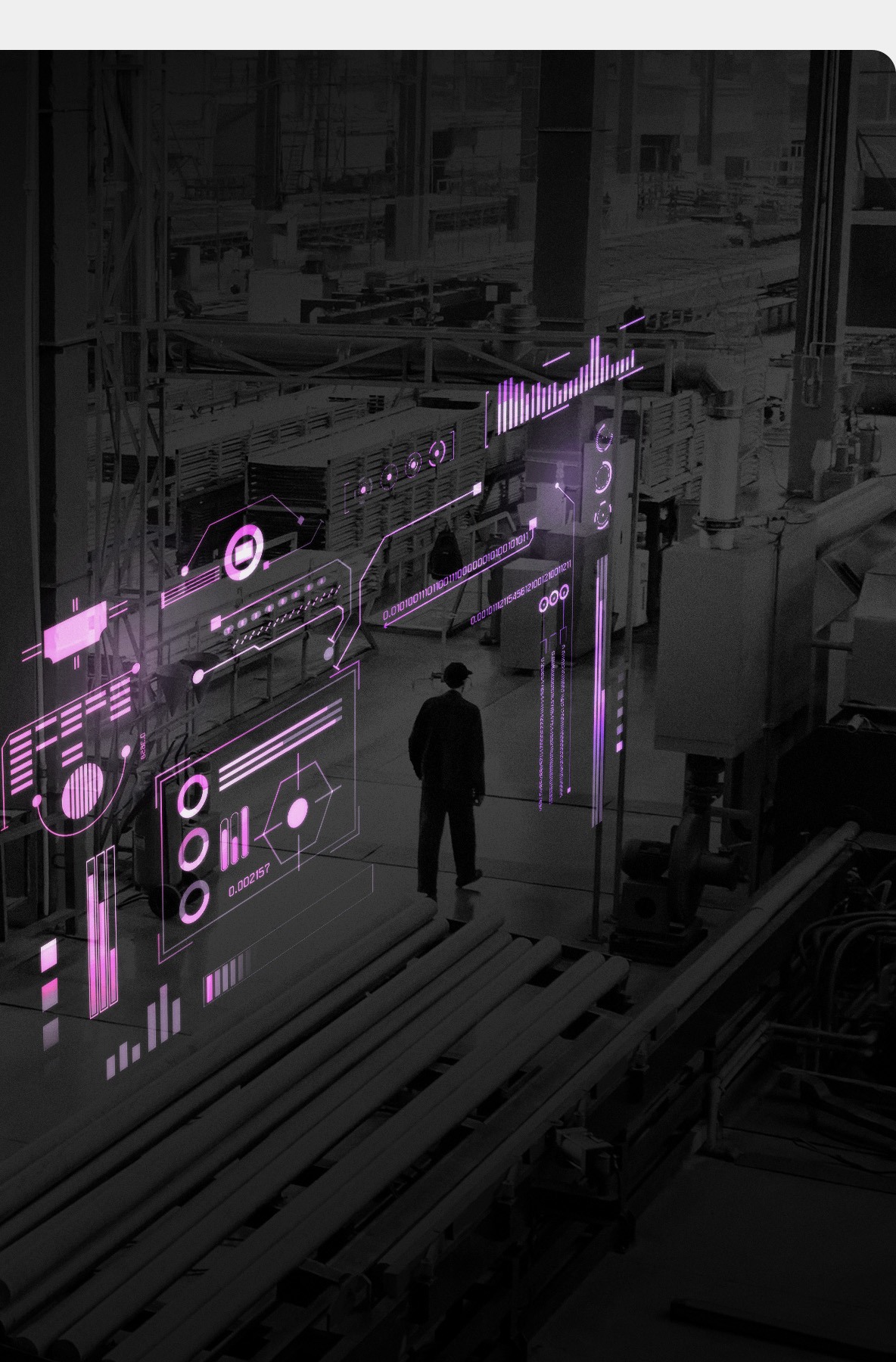Unlock the full value of your data and pave the way for innovation that keeps you at the forefront of the industry.
Get in touch with our team
Schedule a free 30-minute intro call
Kick-start your Data Maturity Accelerator solution
In a rapidly evolving manufacturing industry, meeting customer needs and staying competitive require continuous adaptation and innovation.
That's why we partner with leading manufacturers and brands worldwide to transform their product designs and operations into the smart factories of the future. Our work leverages proven and emerging digital manufacturing technologies to enhance your organization's efficiency, speed, functionality, and overall performance.
Drive measurable progress and secure long-term growth with TXI's digital transformation solutions.


Our data maturity accelerator streamlines your manufacturing operations and production processes, resulting in faster production speeds, minimized downtime, and maximized throughput.
By leveraging digitization, you'll detect deviations from quality standards earlier, consistently producing high-quality products.
Shift from reactive repairs to proactive maintenance. You'll anticipate equipment issues and schedule maintenance proactively, minimizing downtime and keeping production costs in check.
Embrace lean manufacturing principles to improve production lines, enhance transparency across your supply chain, and optimize logistics. This translates to reduced costs and improved delivery times for your customers.

Identify areas of energy inefficiency and implement sustainable practices. This will reduce your energy consumption and associated costs, contributing to a greener future.
Utilize IoT sensors to gain greater visibility and connectivity across your workplace. This allows for continuous monitoring of conditions, ultimately preventing accidents and improving worker safety. Robotics can potentially assist in this endeavor.
Gain access to real-time data to make informed decisions quickly. You'll respond promptly to operational issues and adapt to market changes using machine learning capabilities.
Uncover data-driven trends and patterns that lead to new product ideas. This fuels innovation and helps you stay ahead of the competition.

Your organization holds a wealth of untapped knowledge, just waiting to be unlocked. This white paper provides 36 key questions to help you transform scattered data into strategic insights, foster collaboration, help you scale, and drive revenue-generating breakthroughs. It's time to monetize your data.

TXI is an award-winning digital product agency headquartered in Chicago. For over 20 years, our strategists, designers, engineers, and delivery experts have created meaningful outcomes for our clients by delivering experience-led data products throughout the product lifecycle for mobile, IoT, and devices.
We've gained unique industry insights that reduce risk and uncover new growth opportunities for manufacturers, logistics, healthcare, biopharma, education, and mission-driven organizations.
We founded TXI in 2002 with the philosophy that “trust is harder to build than technology.” Partnering with Fortune 100s, startups, industry leaders, and mission-driven organizations.
TXI is a 100% employee-owned ESOP company. We chose ESOP to make our company more resilient, to make ownership more equitable, and to give all employees the benefit of the value they create.
Unlock the full value of your data and pave the way for innovation that keeps you at the forefront of the industry.
Get in touch with our team
Schedule a free 30-minute intro call
Kick-start your Data Maturity Accelerator solution
Data analytics is a powerful tool that can transform your operations, leading to increased efficiency, cost savings, and improved customer satisfaction. Here's how we can help you leverage data analytics to achieve these goals:
Uncover hidden insights: We'll help you identify key data points across your entire supply chain, from raw materials to finished goods delivery. This data can reveal hidden inefficiencies, bottlenecks, and potential disruptions.
Predict and prevent problems: Through advanced analytics, we can forecast potential issues like material shortages or delivery delays. This allows you to take proactive steps, such as securing alternative suppliers or adjusting production schedules.
Optimize inventory management: Data analytics helps you determine optimal inventory levels to avoid stockouts or costly overstocking. We'll work with you to implement data-driven inventory management strategies tailored to your specific needs.
Boost transparency and collaboration: By sharing real-time data with all stakeholders in your supply chain, you can foster better collaboration and communication. This leads to smoother operations and faster response times to unexpected events.
Make data-driven decisions: Our team of experts can help you translate complex data insights into actionable recommendations. You'll be empowered to make informed decisions
Manufacturing Execution Systems (MES): These software platforms provide real-time data on your production processes, allowing you to identify bottlenecks, track production progress, and optimize resource allocation. TXI can help you choose the right MES and integrate it seamlessly with your existing systems.
Digital Twins: Imagine a virtual replica of your production line! Digital twins allow you to simulate different scenarios and optimize layouts, workflows, and equipment usage before implementing changes in the real world. Develop and utilize digital twins to identify and address potential issues proactively.
Machine Learning and Predictive Maintenance: Sensors on your equipment can collect vast amounts of data. Leverage machine learning algorithms to analyze this data and predict equipment failures before they occur. This allows you to schedule preventive maintenance, minimizing downtime and maximizing productivity.
Industrial Internet of Things (IIoT): By installing sensors throughout your production line, you can gain real-time insights into everything from machine performance to environmental conditions. Design and implement an IIoT system to gather and analyze this data, enabling data-driven decision making for continuous improvement.
Production Planning and Scheduling Software: This type of software helps you optimize production schedules based on real-time data and forecasts. Develop and implement the right software to ensure efficient production flow and meet customer demand on time.
Boost Efficiency: We'll implement or develop tools like Manufacturing Execution Systems (MES) to track production in real-time, identify bottlenecks, and optimize resource allocation. This translates to faster production cycles and increased capacity.
Predict Demand with Data Analytics: Leverage advanced analytics to understand customer buying patterns and forecast future demand. This allows you to pre-emptively adjust production schedules and secure materials, ensuring you have what you need when your customers need it.
Optimize Inventory Management: Implement data-driven inventory management systems. This helps you maintain optimal stock levels to avoid stockouts and fulfill orders promptly. No more lost sales due to unavailable products!
Improve Supply Chain Visibility: Gain real-time insights into your supply chain with Industrial Internet of Things (IIoT). Track material movement, identify potential delays, and proactively address them to keep production flowing smoothly.
Automate Repetitive Tasks: Free up your workforce by automating repetitive tasks like data entry and order processing. This allows them to focus on more strategic activities that contribute to higher output.
In a digital manufacturing environment, the skillset needed by your employees will evolve to encompass a blend of technical and non-technical abilities. Here's a breakdown of some key areas:
Technical Skills:
Data Literacy: Understanding basic data analysis concepts, interpreting data visualizations, and being comfortable working with data will be crucial.
Digital Tool Proficiency: Familiarity with specific digital tools you implement, like MES (Manufacturing Execution Systems) or IIoT (Industrial Internet of Things) platforms, will be beneficial.
Basic Programming or Scripting: While not everyone will need to be a programmer, having some basic scripting or coding skills can be valuable for interacting with digital tools and automating tasks.
Problem-Solving with Technology: The ability to troubleshoot technical issues, identify the root cause of problems using data, and find solutions leveraging digital tools will be important.
Non-Technical Skills:
Critical Thinking and Adaptability: The digital landscape changes rapidly. Employees will need to be comfortable learning new skills, adapting to new technologies, and solving problems creatively.
Communication and Collaboration: Effective communication across departments and with technology providers will be essential. Collaboration will be key to implementing and using digital solutions effectively.
Analytical Thinking: The ability to analyze data, identify trends, and make data-driven decisions will be crucial for optimizing processes and improving efficiency.
Change Management: As digitalization progresses, there will be changes in workflows and roles. Employees will need to be open to change and embrace new ways of working.
Lifelong Learning: The digital world is constantly evolving, so a commitment to continuous learning will be essential for all employees.
In today's data-driven world, organizations are swimming in information. But raw data alone isn't enough to gain a competitive edge. Data products bridge the gap by transforming your data into actionable insights and automated solutions. Imagine going from gut feeling to data-driven decision-making, from manual processes to automated efficiency, and from limited visibility to real-time insights. That's the power of data products.
Data products are more than just fancy apps or reports. They're strategic tools that unlock the hidden potential of your data. They come in various forms, from simple fitness trackers that motivate users to complex systems that automate marketing campaigns, but they all share a common goal: to help you achieve specific business objectives. This could be anything from increasing customer satisfaction to optimizing operational efficiency to uncovering new market opportunities.
Boost efficiency: Automate repetitive tasks, streamline processes, and free up valuable resources for more strategic initiatives. Imagine automating sales reports or financial forecasts, saving time and resources.
Unlock hidden insights: Gain a deeper understanding of customer behavior, product performance, and market trends to make informed decisions. Consider identifying customer segments for targeted marketing campaigns or predicting equipment failures for proactive maintenance.
Improve decision speed: Get real-time insights and actionable recommendations in clear visualizations, enabling faster and more confident decision-making. Picture executives relying on data dashboards to track KPIs and adjust strategies on the fly.
Identify new opportunities: Discover hidden patterns and correlations in your data to uncover new markets, products, or service offerings. Imagine using customer data to identify untapped market segments or analyzing sales data to develop innovative product features.
For example:
Retailer: Develops a data product that analyzes customer purchase history to recommend personalized products and promotions, boosting sales and engagement.
Manufacturer: Creates a data product that monitors equipment performance in real-time, predicting potential failures and preventing costly downtime.
Financial institution: Builds a data product that analyzes customer financial data to offer personalized risk assessments and loan products, attracting new customers and increasing revenue.
Not every organization needs a complex data product, but any organization with untapped data potential can benefit from exploring this path. Assess your current data landscape. Are you making decisions based on intuition or incomplete information? Are there repetitive tasks that could be automated? Are you struggling to gain insights from your data? If so, a data product could be the solution.
Building a data product requires a phased approach:
Understand your data: Where does your data reside? What format is it in? How accessible is it?
Identify user needs: What are the pain points you want to address? What questions do users need to be answered?
Design and develop: Create a product that meets user needs, considering technical feasibility and business viability. Involve users in the process for feedback and buy-in.
Ensure user trust: Be transparent about data sources and methodologies. Provide clear visualizations and explanations. Gather feedback and iterate based on user needs.
Remember: It's not about building the most complex product but the one that solves a specific problem and delivers tangible value.
Examples:
A small business starts with a simple data product that visualizes key sales metrics, enabling better decision-making.
A healthcare provider develops a data product that allows patients to track their health data and receive personalized feedback, improving engagement and outcomes.
A government agency builds a data product that analyzes public transportation data to optimize routes and reduce congestion, enhancing citizen experience.
Data products are only as valuable as the trust they inspire. Building trust starts with transparency. Clearly explain where your data comes from, how it's processed, and how it's used. Use clear and concise language, avoiding technical jargon.
Visualizations are key: Present data in clear, user-friendly formats like charts, graphs, and dashboards. Make it easy for users to understand the story your data tells.
Be open to feedback: Encourage users to provide feedback and iterate on your data product based on their needs. This shows you value their input and are committed to building a product that works for them.
Examples:
A financial app displays data security certifications and allows users to control their privacy settings.
A healthcare platform anonymizes patient data and clearly explains its use for research.
A government website provides open data sets and interactive tools for users to explore information on their own
As data becomes more accessible and integrated into daily tasks, the workforce must adapt.
Expect changes like:
Increased demand for data literacy: Employees must understand how to access, analyze, and interpret data to make informed decisions.
New technical skills: Depending on the specific data applications, some roles may require learning new software or tools.
Evolving soft skills: Critical thinking, problem-solving, and collaboration will be crucial for navigating the data-driven environment.
Invest in training and upskilling programs to bridge the gap and empower your workforce to leverage the new data infrastructure effectively.
Transparency and communication are crucial. Emphasize that:
Automation complements, not replaces: Data tools will likely automate repetitive tasks, freeing up employees for higher-level thinking and strategic work.
Reskilling and upskilling opportunities exist: Invest in programs to equip employees with the skills needed to thrive in the evolving landscape.
Employee involvement is key: Include employees in discussions about automation and in shaping the future of work.
Foster a culture of:
Openness and transparency: Encourage data sharing and collaboration across departments.
Continuous learning: Promote a growth mindset and support ongoing learning about data and technology.
Experimentation and innovation: Create space for experimenting with new data-driven approaches and ideas.
Leadership buy-in: Ensure leadership actively supports and promotes the data-driven culture.
Remember, empowering your workforce with data is an ongoing journey. By addressing these questions and implementing thoughtful strategies, you can leverage your data infrastructure to its full potential and unleash the power of your people in the Industry 4.0 era.
We create transformative experiences for Chicago’s top manufacturing and logistics companies.
